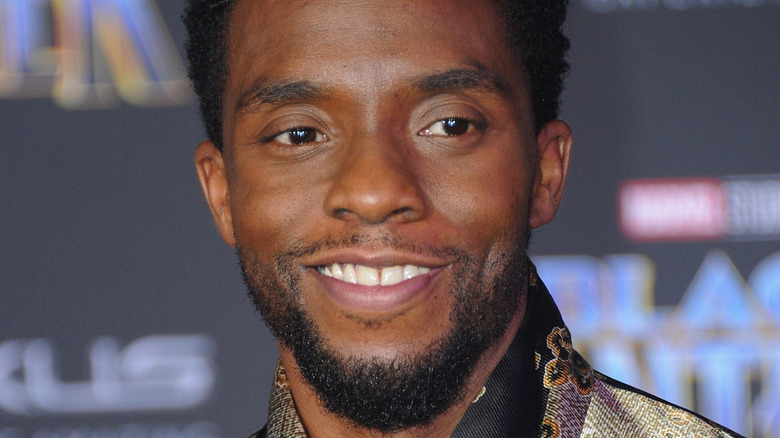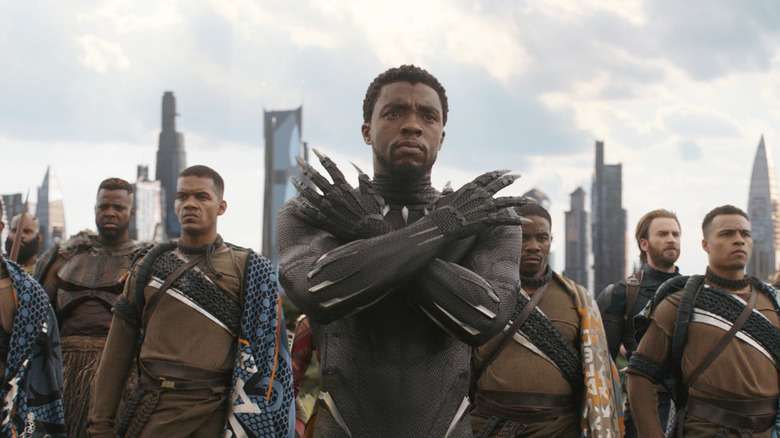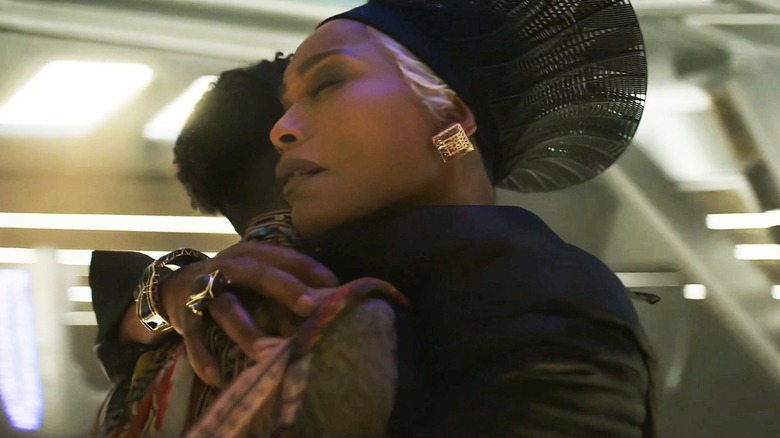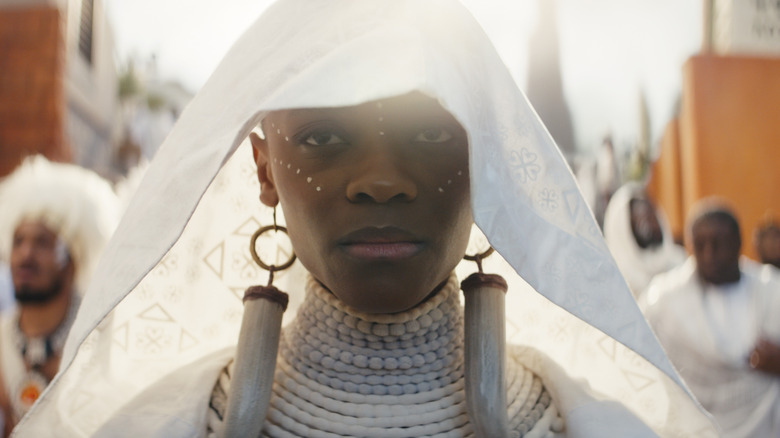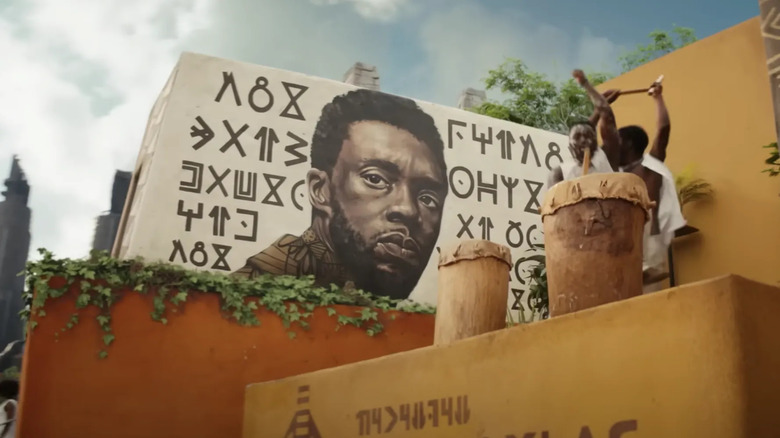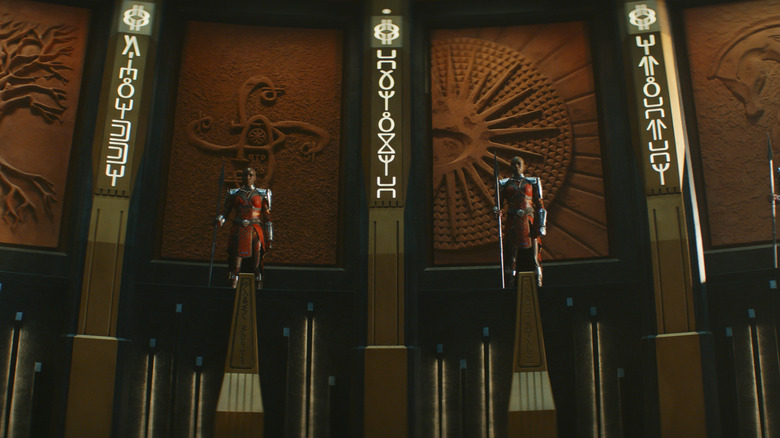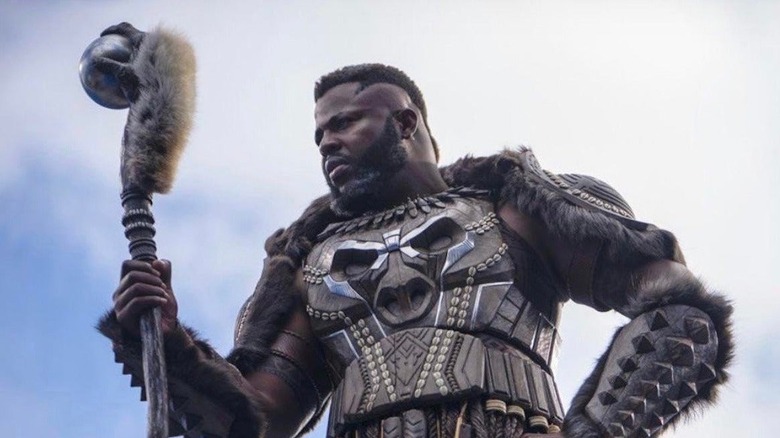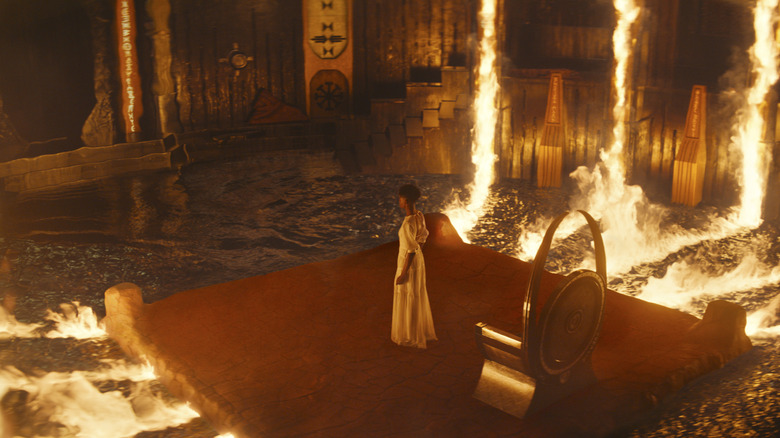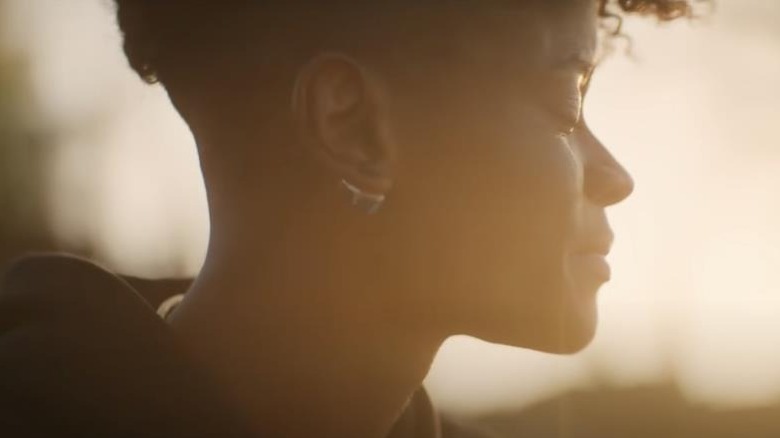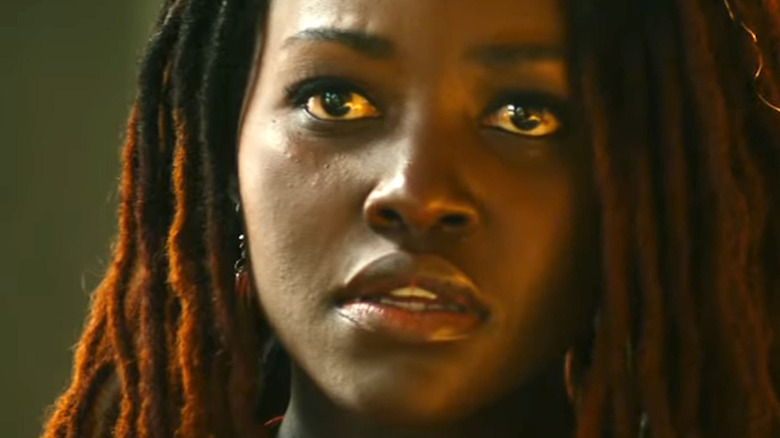All The Ways Black Panther: Wakanda Forever Pays Tribute To Chadwick Boseman
Contains spoilers for "Black Panther: Wakanda Forever."
There may never have been such a blend of anticipation and existential dread over the release of what's sure to be an enormous blockbuster. "Black Panther: Wakanda Forever" is a big-budget comic book movie about hidden kingdoms, magic metals, an a mutant God King who inhabits the air, land, and sea. It's got car chases, flight sequences, and fight scenes on the sides of boats and in rings of fire. The direct sequel to 2018's "Black Panther" — which made more than a billion dollars and was nominated for seven Academy Awards — is every bit as maximalist as Marvel fans have come to expect. So far, reviews have been positive and box office looks strong.
But fans of Chadwick Boseman, "Black Panther," and the wider Marvel Cinematic Universe have been wondering and worrying about how "Wakanda Forever" would play without the star at the center of its universe. Was it the right call not to recast T'Challa with another actor? Would the movie still hold together if it had to work around the Chadwick Boseman-sized hole in its plot? Would it be too sad, or not sad enough? And would the public be interested in a Black Panther story without the character they knew and loved as the Black Panther?
The resulting film is a showy superhero movie that's also a meditation on grief and a fitting homage to the late actor. Chadwick Boseman may not physically appear in "Wakanda Forever," but his presence and influence can be felt throughout the movie's weighty runtime, in ways large and small, both obvious and discreet.
The opening credits
"Wakanda Forever" is the 30th feature film in the Marvel Cinematic Universe. By now, audiences are so familiar with the MCU's opening credits format, we could all probably reproduce the moving letters and rousing music from memory. But Marvel has been experimenting with its recognizable logo as of late. The titles for "Thor: Love and Thunder" swapped the traditional MCU soundtrack for a Guns & Roses-esque power ballad version, and "Werewolf by Night" bypassed them altogether for its own short, snappy, and brightly colored introduction. But Marvel Studios' opening credits have never looked or sounded like they do in "Wakanda Forever," and they've never been used for such a purpose before.
The standard sequence sees hand-drawn Marvel Comics illustrations morph into live-action Marvel Studios film clips, all on the surface of 3D block letters. As each new superhero is introduced, they get added to the next entry's graphics. For example, since "Eternals," Shang Chi can be seen inside the M in Marvel. In "Wakanda Forever," rather than the entire stable of Marvel superheroes being represented, every still and clip is of Chadwick Boseman as T'Challa. For the first time, there's no music underscoring the visuals — it's 30 seconds of respectful silence. As the words "Marvel Studios" fix themselves in the center of the screen, they briefly glow purple (the shade of the heart-shaped herb) before fading into the silver and black of T'Challa's Black Panther suit. There's nothing especially deep about superficial changes to a corporate logo, but they help to set the tone for the film that's about to unfold.
T'Challa's death mirrors Boseman's
Boseman's tragic death in August of 2020 meant that "Black Panther: Wakanda Forever" had to be re-written from a script that was already in the works (per The Independent). Fans and filmmakers alike debated about the best way for forward for the franchise (via The Hollywood Reporter). Given the choice between recasting the main character or elevating the status of one of the supporting players, Director and co-writer Ryan Coogler opted for the latter and got to work re-tooling the script.
The movie opens with a heart-wrenching scene in which Shuri is racing against the clock to improve the formula of her synthetic heart-shaped herb. At the start, it's only about 30 percent effective. But before she can test out the unlikely cure, her mother, Queen Ramonda, announces that T'Challa has gone to his ancestors. The Black Panther's death from an illness that modern medicine — even Wakanda's — can't treat is an obvious allusion to the Boseman's own death from colon cancer at the age of 43.
It was both smart screenwriting and compassionate collaborating that led to this decision. As Coogler explained to The Hollywood Reporter, Boseman's family consulted on the film, which ensured that the final product would show the late actor proper deference. Other franchises have had to deal with similar issues, though not to this extent. For example, Carrie Fisher's death between production on "The Last Jedi" and "The Rise of Skywalker" deeply affected the final chapter of the "Star Wars" saga. She was expected to play a larger role in the third movie in the sequel trilogy, but her death changed those plans. By not straying too far from the truth, "Wakanda Forever" allows us to mourn Boseman and T'Challa at the same time without trivializing the tragedy.
The funeral celebration
The primary way we and the characters in "Wakanda Forever" mourn the loss of the real actor and the fictional King is through T'Challa's emotional and elaborate funeral festivities. In "Captain America: Civil War," T'Challa talks to Natasha about how he's processing his own father's death after the bombing in Vienna. He explains it thus: "In my culture, death is not the end. It's more of a stepping off point. You reach out with both hands and Bast and Sekhmet, they lead you into a green veld where you can run forever." Since Wakandans believe in an afterlife and a spiritual realm, the sad occasion of the King's funeral is both an opportunity to grieve and an a celebration of his life.
Wakanda's people have gathered en masse, in gauzy white ceremonial clothing. Some wear headdresses. Some have painted faces. Motifs of the heart-shaped herb, Bast, and even the Jabari's Hanuman god can be seen in the fabrics, jewelry, and makeup. The aesthetics of the funeral pull from African cultural and religious heritage. The vibe is one of peace and even joy as people dance and sing. But there are plenty of nods to Wakanda and to Chadwick Boseman's vaunted place in the MCU as well. Shuri grasps his Black Panther mask as she marches to his casket, which bears a relief of T'Challa in the Wakanda Forever pose and appears to be made out of Vibranium.
The mural
During the funeral, we see a shot of two drummers playing in front of a mural of King T'Challa. Wakandan letters surround a black and white painting of the fallen Black Panther's face. Production designer Hannah Beachler actually developed a written language for Wakanda in the first film (per IndieWire). Here, those characters are used here to spell out, "The King lives and the panther forever with us." (There appear to be more letters that are obscured by the plants and the drums, so this probably isn't the complete sentiment.)
The mural gives filmmakers a way to show T'Challa's face without Boseman's physical presence and without resorting to flashback too often. But it's also a reference to something that really happened in the wake of the beloved actor's death. Disneyland commissioned an official mural of Chadwick Boseman that was displayed at Downtown Disney, and it eventually moved to a children's hospital, where it will remain as a permanent installation (per ABC7). Other murals began to pop up around the country to honor the man who had been a hero and an inspiration to so many (via Brixton Blog). The mural in "Wakanda Forever" is an acknowledgement of T'Challa's importance to the Wakandans and of Boseman's importance to multiple communities, from his hometown to his alma mater, Howard University (which has recently named its fine arts department after him), to the wider Black community and the MCU fandom.
Carvings on columns
The Wakandan alphabet can be spotted throughout both "Black Panther" films, perhaps most obviously in a scene in the sequel when Riri Williams is taken back to the secretive African nation and sees their rich culture and advanced technology for the first time. As she's given a sort of VIP tour, the Dora Milaje stand guard in front of rectangular columns which are lit from within and decorated with Wakandan characters. Each one contains a word or phrase, and the five that are most visible during Riri's visit spell "In power, T'Challa, our hero, an honor, forever."
This palatial room certainly looks like it's been around for a long time; in between the columns are what look like red clay carvings of important Wakandan symbols and myths. But it's possible that in the world of the movie, Queen Ramonda has gone to great lengths to honor her son and — since the heart-shaped herb is still extinct at this juncture — potentially the last Black Panther Wakanda will ever know. It's just as likely that designers added this detail as an Easter egg and an extra way to stamp Boseman's memory onto the set.
Nobody can replace him
That nobody can replace T'Challa as king or as Black Panther in the movie becomes a meta commentary on the idea that nobody could really replace Chadwick Boseman in the role. For the purposes of the story, Wakanda is without its protector because Erik Killmonger, aka N'Jadaka, burned the reserves of the heart-shaped herb so that no one could challenge him during the events of the original film. So, as "Wakanda Forever" begins, literally no one can replace T'Challa since the enhanced powers of the Black Panther aren't available to them without their vibranium-laced plants.
Queen Ramonda is acting as Regent (and doing a pretty effective job, based on her performance at the United Nations), Shuri seems more interested in science than politics, and M'Baku is content to lead the Jabari and be an ally of the Wakandan crown, which is how we left him at the end of the last movie. And since Shuri has given up on the idea of creating a synthetic heart-shaped herb, everybody else has given up on the idea of there ever being a Black Panther again. Indeed, there isn't one until the climax of "Wakanda Forever." Narratively, this works well to give Boseman his due and to build anticipation for the moment when Shuri will finally take the mantle.
Killmonger compliments him
One of the reasons Chadwick Boseman's loss hit so hard among moviegoers who didn't know him personally was because the actor gave off such a warm, authentic, and eminently likable energy. He brought that energy to T'Challa, who was among the more stoic characters in the MCU. Black Panther didn't get quips and gags like Iron Man, Ant-Man, Star Lord, or Doctor Strange. He was the MCU's straight man, even more so than Captain America. In stark contrast, Killmonger — his cousin and antagonist in "Black Panther" — got to chew the scenery while T'Challa remained regal and restrained.
Michael B. Jordan gets to come back in one of the MCU's more purposeful cameos as Killmonger, who didn't make it out of the last movie alive. When Shuri enters the ancestral plane, she wants to see her brother or her mother. But that's not how this place works. The afterlife shows you who you need to see, to answer the questions that are unsettled within your soul. For Shuri, that's Killmonger, who shares the rage she has at having lost her family.
It would've been unrealistic for Killmonger — a notoriously confrontational and viciously honest character — to have softened too much toward his former rival. What N'Jadaka has to say to Shuri about her brother is completely in keeping with his character. He admits that T'Challa was a good man, but warns Shuri that he was too noble for his own good. Shuri takes this advice to heart, waging war against Talokan until she realizes her and Namor's thirst for vengeance can only end in calamity for both of their nations.
Shuri burns her funeral clothes
"Wakanda Forever" pulls a fast one on us after the climactic battle on the boat. We're transported back to Wakanda's iconic waterfalls and the site of the two challenges to T'Challa's reign. An aircraft lowers itself to the water, and we expect Shuri to appear in the doorframe. Instead, M'Baku appears, explaining that Shuri has something more important to do. Next, we cut to Haiti, where Shuri has taken Nakia up on her offer of a place to stay. What Shuri's about to do, though, she has to do on her own. Nakia gives her the privacy she needs, and Shuri walks down to the beach, where she unwraps the white ensemble she'd worn to her brother's funeral and sets it aflame.
Shots of the fibers burning are intercut with breathtaking shots of Shuri in profile beginning to cry. When she closes her eyes, we see a montage of her memories of T'Challa, made up of Boseman's highlights from his four-film tenure in the MCU. These clips crossfade into the end credits, accompanied by Rihanna's new original song, "Lift Me Up," the lyrics of which include the repeated phrase, "Keep me in the warmth of your love when you depart." It's undoubtedly the quietest, calmest, and most earnest ending in MCU history. This symbolic end to Shuri's mourning period is also incredibly cathartic for the audience, who's probably dabbing the tears from their eyes when the final title card, reading, "Dedicated to our friend, Chadwick Boseman."
The mid-credits scene
Usually, Marvel's mid and end-credits stingers are reserved for teasing new projects and making tongue-in-cheek jokes. "Wakanda Forever" uses its lone and longer-than-usual mid-credits scene to touchingly and gracefully transition the "Black Panther" franchise-within-a-franchise onto the next leg of its journey. While Shuri's still having a moment on the beach, Nakia walks down to where she's sitting with a young boy. She introduces him as her son and Shuri's nephew, Toussaint. As it happens, T'Challa prepared Nakia and their secret son for his death, and the family of two has been living in Haiti expressly to stay away from whatever drama will await the young Prince when he comes of age. Shuri is heartened to find out that Ramonda got to meet her grandson before she died.
Then, the adorable kid tells his Aunt Shuri that Toussaint is his Haitian name (and likely a reference to Toussaint Louverture, General of the Haitian Revolution, as explained by Auralcrave). His real name is T'Challa. This new and unexpected mid-credits information is an elegant solution to the problem of whether or not to cast a new King T'Challa. Introducing the character's son allows Boseman to remain the sole actor to portray King T'Challa, son of T'Chaka, while the next generation's T'Challa can eventually become a part of the MCU is his own right.
